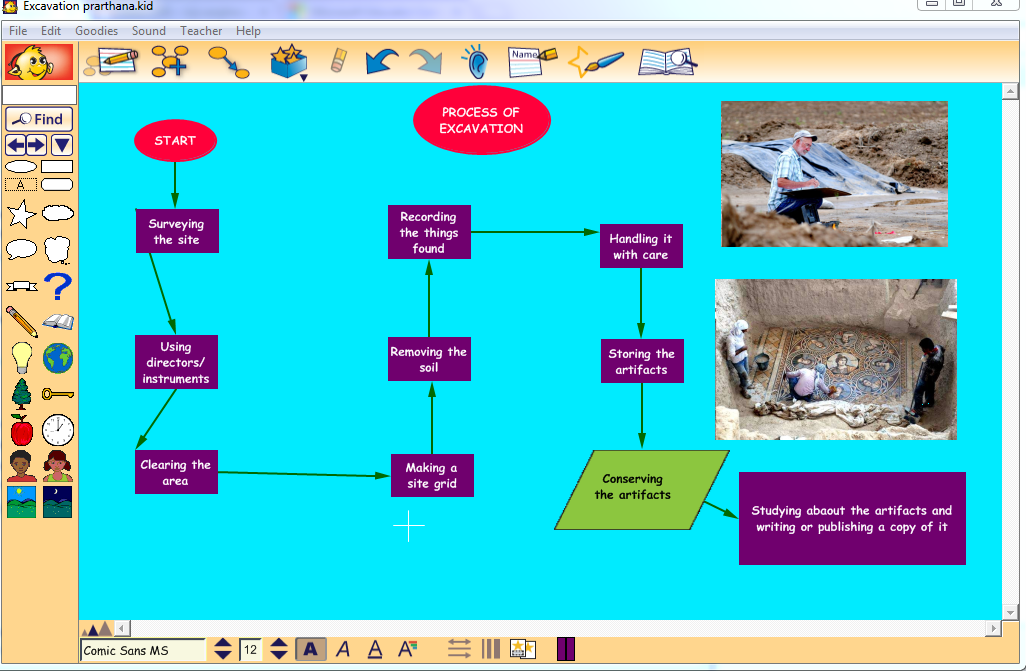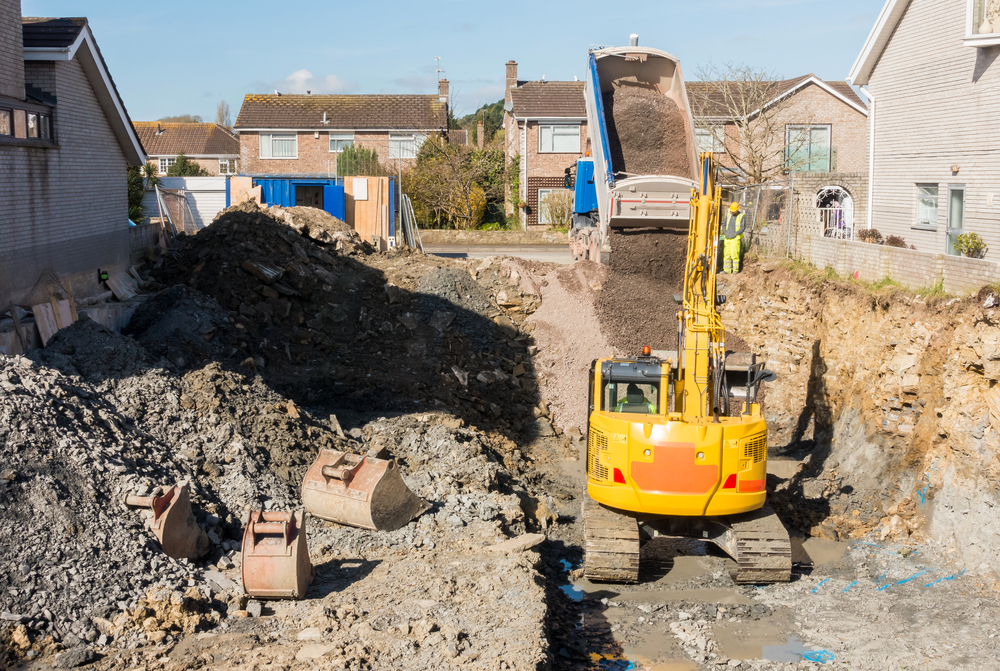Some Of Demolition
Wiki Article
How Excavation Contractors Near Me can Save You Time, Stress, and Money.
Table of ContentsGetting My Trencher To WorkOur Excavation Companies StatementsSome Known Incorrect Statements About Excavation Companies The Main Principles Of Demolition All about Excavator


Scrapers or Pans excavate soil in one place, haul and also dump the soil in an additional spot (excavating contractors). It is difficult to match the performance of scrapers for cut/fill dirt operation if the haul distance is less then a mile. Scrapers are normally drawn by a rubber tire wheel tractor and are in some cases pressed via the cut area by a bulldozer.
There are lots of times that scrapes are not made use of for website grading and a dump truck is employed: the haul may be to long, the haul may cross roads where scrapes are not allowed, acid rock may be come across, tools availability, etc. Dispose trucks are in typical usage and also probably need little conversation.
"Rock body" beds, on the various other hand, have no tailgates and can dispose any dimension rock, although their quantity capability is reduced. Compaction Devices boosts the density of the soil as well as in some situations supplies a smooth, rolled surface.
What Does General Contractor Mean?
From a simple test pit to percussion exploration to core drilling the owner has significantly much more expensive alternatives that generate significantly far better information concerning the site underground. For instance, the Proprietor on a 100,000 SF structure task may license twenty boring areas with split spoon soil samples taken till rock is gotten to and afterwards core examples of rock.Knowing the kind and also high quality of rock (from the core examples) and location of rock (from the dirts boring) is a genuine advantage in jobsite planning. Conversely, the Proprietor of a 100,000 SF structure might determine to proceed with no geotechnical testing whatsoever. The choice regarding geotechnical screening is usually made by a Proprietor without any input from the Construction Supervisor.
The section on Dirts as well as Geology aids you understand the terms in the geotechnical record. An expertise of the approximate area of the rock assists the Building Supervisor to intend the sequence of actions adhering to rock excavation. If rock is in one corner of a big building job, as an example, the planet excavation could start at the opposite end of the structure in order to start structure work soonest.
Beginning the foundation job early would be an excellent concept if the rock might be gotten rid of by tearing. If the rock is incredibly hard as well as needs significant blasting, it may be sensible to hold foundation job until the blasting is finished. The Building and construction Supervisor ought to coordinate these sorts of choices as well as make use of all the technical date offered.
Excitement About Trencher
Unidentified excavation states that all rock or my latest blog post other unanticipated materials (omitting harmful materials) experienced in the sitework will be the responsibility of the Contractor at no modification in contract price. An unclassified excavation is easier from a book-keeping standpoint and also places the responsibility for geotechnical problems onto the Sitework Specialist.How Water Influences Sitework? It's remarkable what a hefty rainfall can do to a construction project. Prior to the rain, the website might be Continue dry, hefty equipment effectively relocating earth, the various other trades efficiently performing their job. Within hours the task can be a careless, mud-hole with employee performance cut to concerning 10%.
In most areas of the globe, the Construction Manager need to bear in mind a basic reality: IT WILL RAIN. Good preparation can decrease the damages as well as interruption of a hefty rainfall to a jobsite. Commonly the excavation as well as grading is left to the Sitework Specialist (and their Foremen is liable to monitor and also guide the heavy tools as well as drivers).
Therefore the Building Manager must be continually familiar with what rainfall will certainly do to the job website. It is not uncommon for anchor the Sitework Foreman to work their hefty tools for optimal performance as well as hope it doesn't rainfall. Among the finest methods to get ready for rain is to incline all qualities to drain and to smooth rolled the surface area before a rainfall.
Excavation Companies Fundamentals Explained
The Construction Supervisor need to be perceptive adequate to guarantee that hefty rain does not quit working on the project longer than necessary. Daily discussions with Sitework Foremen may be needed to accomplish this goal. Any type of time excavation is needed listed below the existing aquifer on a task, the procedure of dewatering must be considered.In a genuinely natural dirt, the water takes a trip so gradually through the clay or silt that dewatering is not typically needed for the relatively short time of excavation. Dewatering might be needed for a solitary ground excavation or for an entire task website. The most usual dewatering methods are trench drains, deep wells as well as well points.

Ground water seepage can likewise be lowered by cutoff approaches such as sheet piling. The expenses for dewatering can be astonishing, consisting of tools leasing, labor and also electrical energy (or gas). High dewatering costs have faded the profit margins on much way too many tasks. The lots of variables listed here make the job of approximating dewatering expenses really tough, and really inexact.
This option must always be considered when assessing the prospect of dewatering. Clearly the choice is just practical if gravity can run the water to lower ground. Trench drains can be reduced with a backhoe and loaded with a rugged, granular material (# 4 rock for example), but treatment must be exercised in choosing the water electrical outlet type and place.
Getting The Mini Excavator To Work
A siphon, necessarily, makes use of atmospheric stress to carry water from one altitude, up over a barrier, to a lower altitude. The pipes in a siphon system must be closed and some resourcefulness is commonly needed to completely fill up the siphon pipeline. The siphon pipe need to be complete for the siphon to begin.A deep well consists of a pump, pipe as well as a vertical well casing. The pump intake is at the bottom of the well housing (normally some crushed rock is put there as a filter tool) (grading contractors). The water is inflated the hose, out of the well covering, and also to an ideal discharge area.
In a crude sand, as an example, a huge area can be pumped to near the pump consumption elevation. A less permeable soil, on the various other hand, minimizes the effectiveness of a deep well. Because the pump is typically at the base of the deep well, there are no elevation restrictions because of vacuum lift, and deep wells can reduce the groundwater over 50 feet.
On the bottom of the wellpoint there is a 2 foot long screen and also valve, water jets out of this shutoff and develops a hole right into which the wellpoint pipe can be decreased. This hole is often made a larger size (as an example 10 inches) to enable a coarse sand backfill to help filter the water (demolition).
Report this wiki page